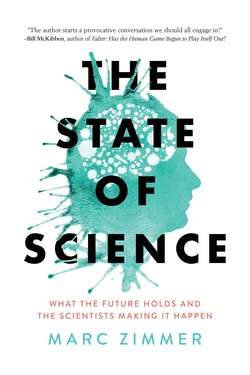Читать книгу The State of Science - Marc Zimmer - Страница 6
На сайте Литреса книга снята с продажи.
What Is Science?
ОглавлениеThis is probably a good point in the book to define “science” and “scientist.” The Merriam-Webster Collegiate Dictionary defines science as “the state of knowing” as distinguished from ignorance or misunderstanding.” However, I much prefer Karl Popper’s perspective, according to which a hypothesis has to be inherently disprovable for it to be a scientific theory. It is difficult to imagine an experiment that can disprove the existence of beauty and God. Hence the study of beauty and God is not science. Albert Einstein proposed the existence of gravitational waves. Their existence was provable, although the equipment to do so didn’t exist when Einstein came up with his general theory of relativity, and it took close to 100 years to actually prove that they exist (chapter 6). It was disprovable and therefore a scientific theory. Scientists use experiments to test their theories and hypotheses. No map shows the way to prove or disprove a theory; the scientific process is not linear. Neil Gershenfeld, director of MIT’s Center for Bits and Atoms, writes that “to find something that’s not already on the map, you need to leave the road and wander in the woods besides it.” He feels that nonscientists do not recognize that “science appears to be goal-directed only after the fact. While it’s unfolding, it is more like a chaotic dance of improvisation, than a victory march.”[1] It is also important to realize that uncertainty is an inherent and unremovable component of scientific experimentation. It is not a weakness; it is a strength. Critics of science often disparage scientific results on the basis of included uncertainties. This is a mistake born from a lack of understanding.
Before 1833, people who conducted experiments—who mixed, observed, and synthesized chemicals—were called natural philosophers. Newton, Galen, Galileo, and Mendel were all natural philosophers. In 1833 William Whewell, a professor at Cambridge University, coined the term “scientist” to highlight the fact that these were empirical folks and not philosophers of ideas. Like an artist works with art, a scientist works with science. As an analogy of “artist,” the word “scientist” was infused by Whewell with creativity, intuition, and professionalism.
There is a commonly told tale that Whewell derived and popularized the term “scientist” because he needed an alternative to the commonly used phrase “man of science” to describe Mary Somerville in a positive review he was writing about her.[2] If true this would be a great story, and Mary Somerville was worthy of the honor. Her book On the Connexion of the Physical Sciences was instrumental in making modern physics into a discipline and was frequently revised and republished, with nine separate editions. In 1879, the first women’s college at Oxford University was named in her honor. A main-belt asteroid (5771 Somerville) and a lunar crater in the eastern part of the moon are also named after her, and she graces all Scottish ten-pound notes printed from October 2018 onward. However, according to James Secord, professor of philosophy of science at the University of Cambridge, “Nowhere did Whewell or anyone else in her lifetime ever call Somerville a scientist, nor is it a word, so far as we know, that she ever used herself. By our current understanding of the term, Somerville can certainly be called a scientist, but for her contemporaries she belonged to a higher and more profound category entirely.”[3]
No matter whether Mary Somerville was the woman for whom the word “scientist” was made, we can think of scientists as empiricists who use their creativity to prove or disprove theories. Of course scientists are human, as they can discover gloriously complex theories while also misinterpreting and presenting data in wondrously imperfect ways that lead to fantastic new models that are wrong and subsequently disproven. That is the way scientists perform science.
Before going on a trip through the scientific world and trying to judge its impact on our lives, as well as its reputation and health, it is a good idea to take a few steps back and look at the big picture. Because when we talk about science, it is impossible to ignore the political, environmental, economic, and global surroundings. We need to know how science has gotten us here and what challenges it faces in today’s world.
